“Link Prediction of Weighted Triples for Knowledge Graph Completion Within the Scholarly Domain” is a journal paper accepted at IEEE Access Mojtaba Nayyeri1,2, Gökce Müge Cil1, Sahar Vahdati2, Francesco Osborne3, Andrey Kravchenko4, Simone Angioni5, Angelo Salatino3, Diego Reforgiato Recupero5, Enrico Motta3, Jens Lehmann1,6 1 SDA Research Group, University of Bonn, 53115 Bonn, Germany 2 […]
Category: Publications
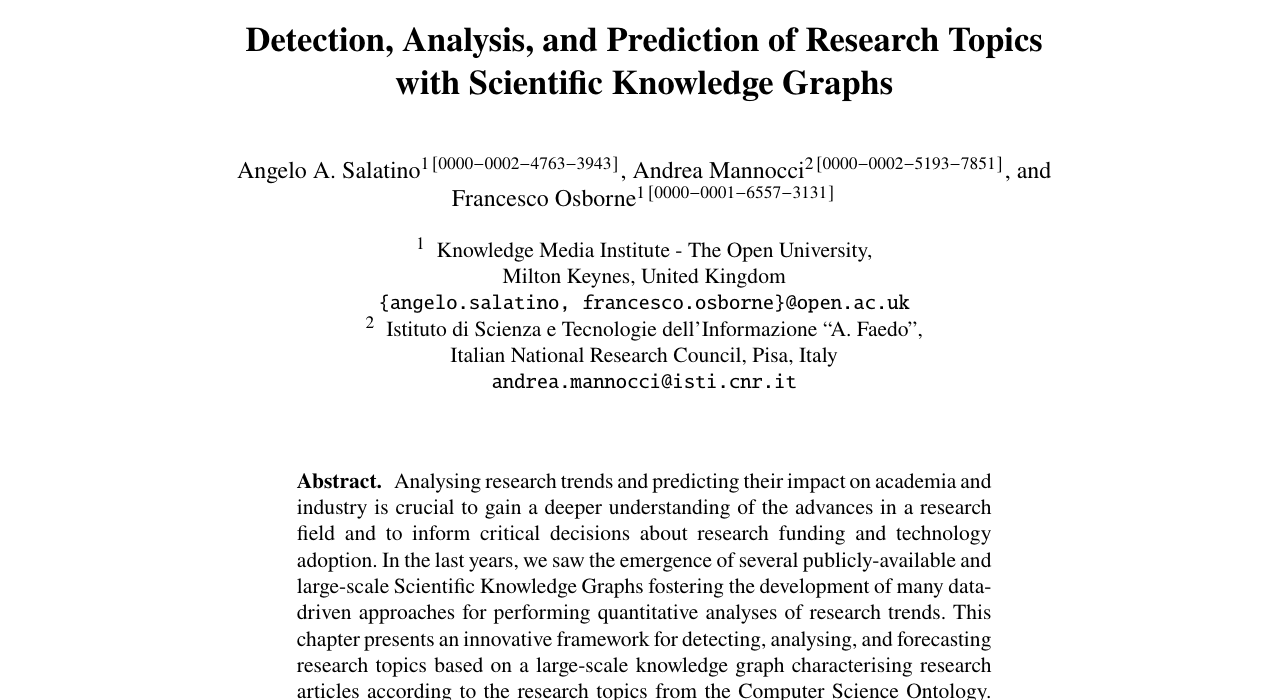
Detection, Analysis, and Prediction of Research Topics with Scientific Knowledge Graphs
“Detection, Analysis, and Prediction of Research Topics with Scientific Knowledge Graphs” is a book chapter of “Predicting the Dynamics of Research Impact” edited by Springer. Angelo A. Salatino1, Andrea Mannocci2, and Francesco Osborne1 1Knowledge Media Institute – The Open University, Milton Keynes, United Kingdom 2Istituto di Scienza e Tecnologie dell’Informazione “A. Faedo”, Italian National Research […]
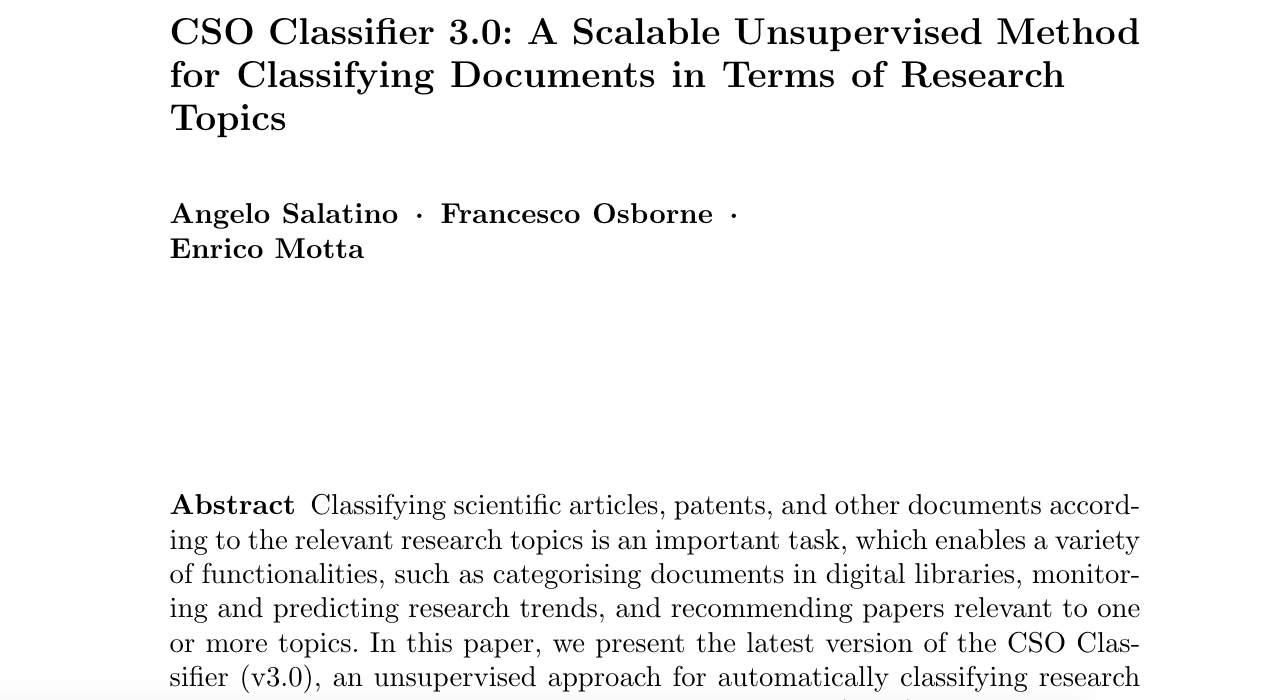
CSO Classifier 3.0: A Scalable Unsupervised Method for Classifying Documents in Terms of Research Topics
“CSO Classifier 3.0: A Scalable Unsupervised Method for Classifying Documents in Terms of Research Topics” is a journal paper accepted at the Special Issue of “TPDL 2019 & 2020” at Scientometrics. Angelo Salatino, Francesco Osborne, Enrico Motta Abstract Classifying scientific articles, patents, and other documents according to the relevant research topics is an important task, […]
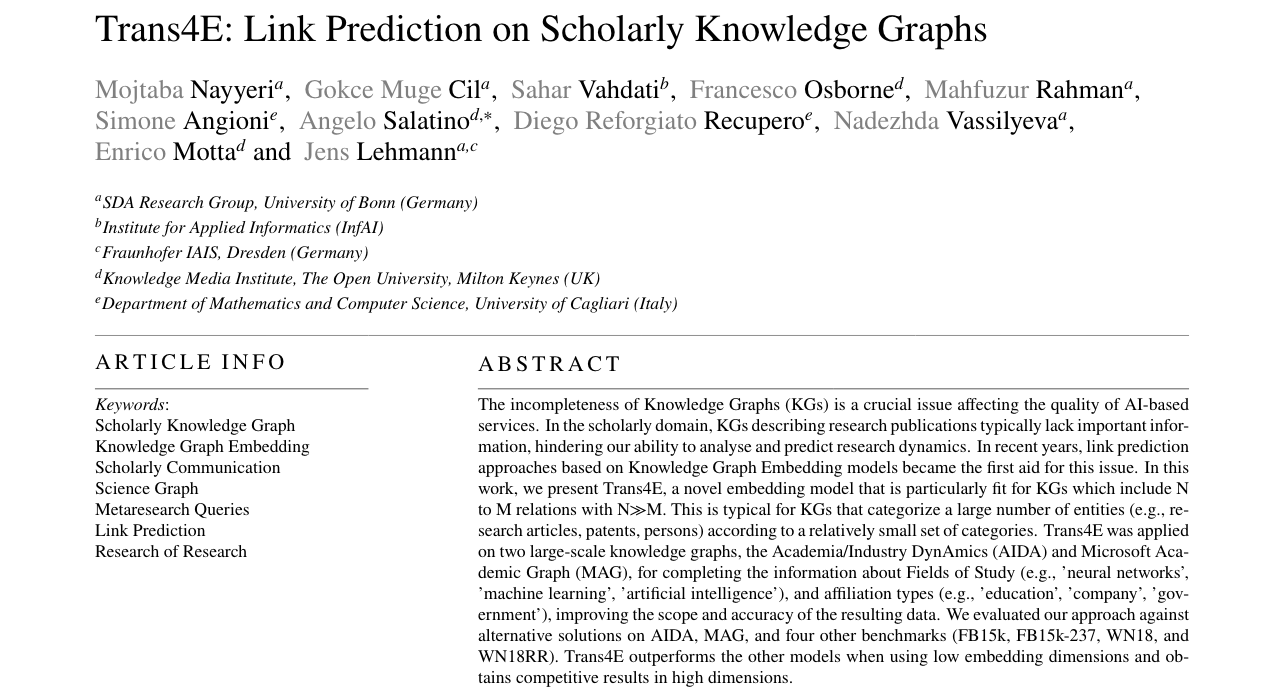
Trans4E: Link Prediction on Scholarly Knowledge Graphs
“Trans4E: Link Prediction on Scholarly Knowledge Graphs” is a journal paper submitted to the Special Issue on “Knowledge Graph Representation & Reasoning” at the Neurocomputing Journal Mojtaba Nayyeria, Gokce Muge Cila, Sahar Vahdatib, Francesco Osborned, Mahfuzur Rahmana,Simone Angionie, Angelo Salatinod, Diego Reforgiato Recuperoe, Nadezhda Vassilyevaa, Enrico Mottad and Jens Lehmanna,c aSDA Research Group, University […]
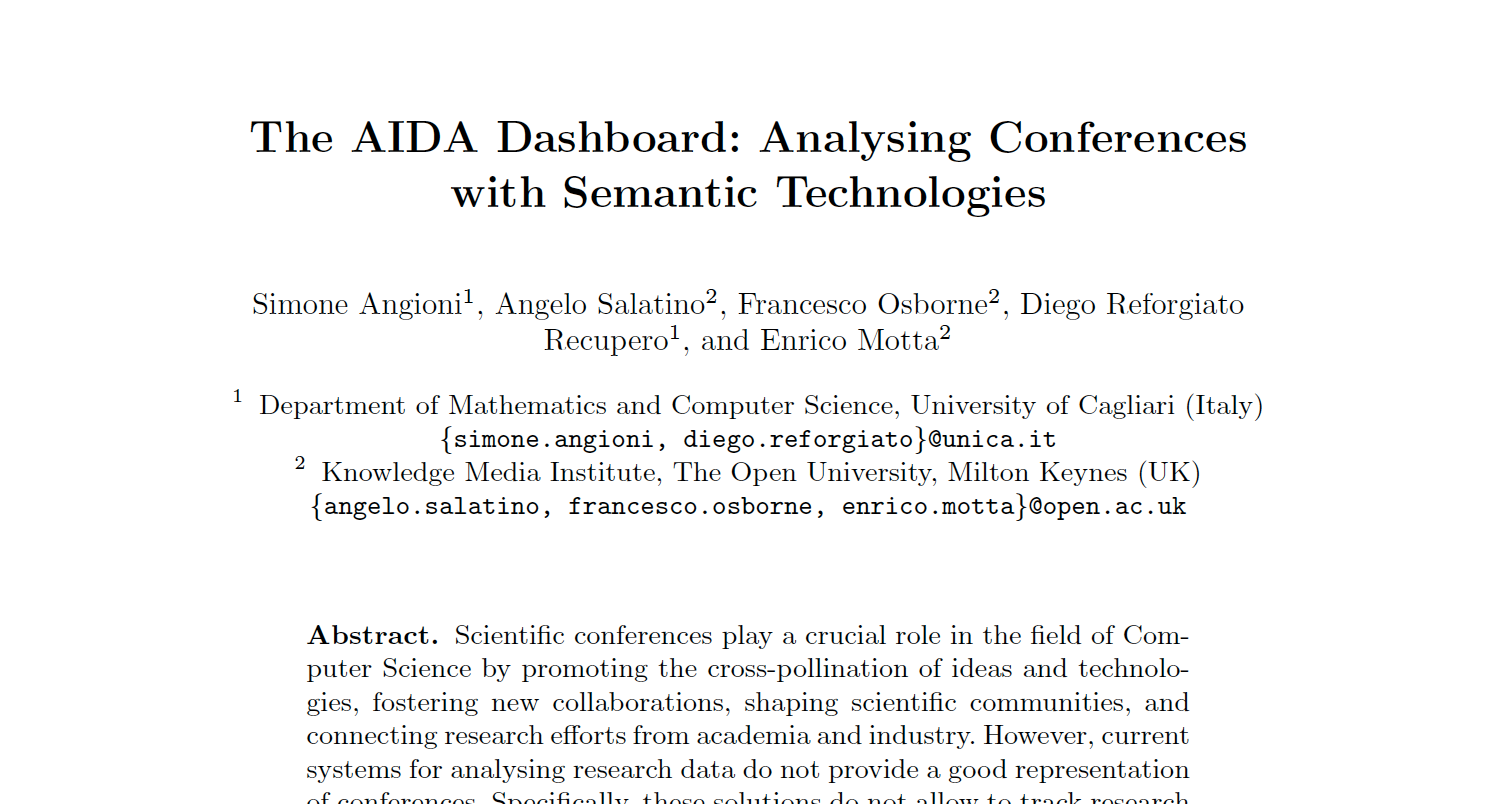
The AIDA Dashboard: Analysing Conferences with Semantic Technologies
“The AIDA Dashboard: Analysing Conferences with Semantic Technologies” is a demo paper submitted to the Posters and Demos tracks of the 19th International Semantic Web Conference. Simone Angioni1, Francesco Osborne2, Angelo A. Salatino2, Diego Reforgiato Recupero1, Enrico Motta2 1 University of Cagliari, Via Università 40, 09124 Cagliari 2 Knowledge Media Institute, The Open University, […]
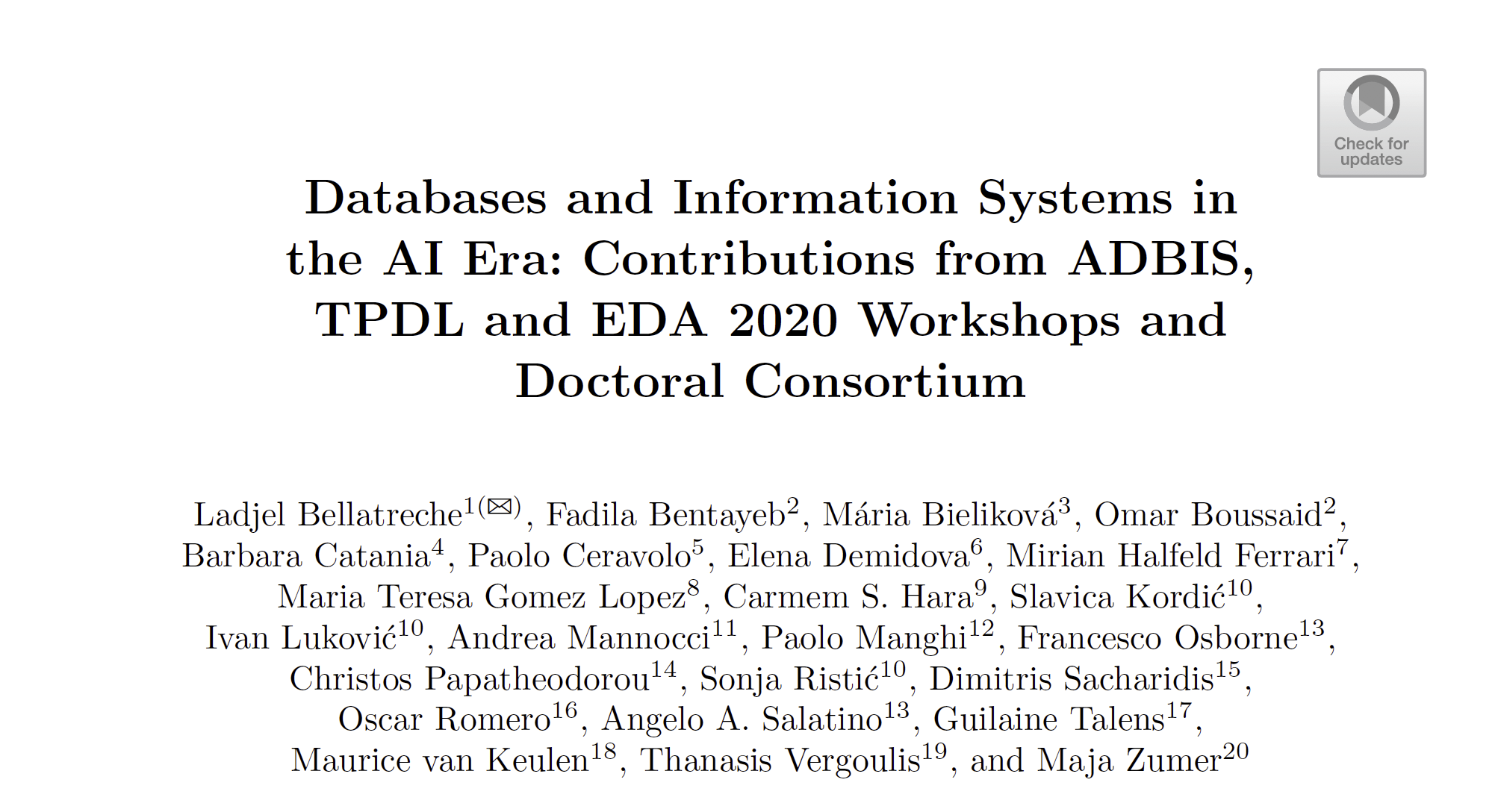
Databases and Information Systems in the AI Era: Contributions from ADBIS, TPDL and EDA 2020 Workshops and Doctoral Consortium
“Databases and Information Systems in the AI Era: Contributions from ADBIS, TPDL and EDA 2020 Workshops and Doctoral Consortium” is the introductory chapter for the ADBIS , TPDL and EDA 2020 Common Workshops and Doctoral Consortium proceedings as satellite events of the 2020 International Conference on Theory and Practice of Digital Libraries (TPDL2020). Ladjel Bellatreche, […]

ResearchFlow: Understanding the Knowledge Flow between Academia and Industry
“ResearchFlow: Understanding the Knowledge Flow between Academia and Industry” is a conference paper submitted to Knowledge Engineering and Knowledge Management – 22nd International Conference, EKAW 2020. Angelo Salatino, Francesco Osborne, Enrico Motta Abstract Understanding, monitoring, and predicting the flow of knowledge between academia and industry is of critical importance for a variety of stakeholders, including governments, funding […]
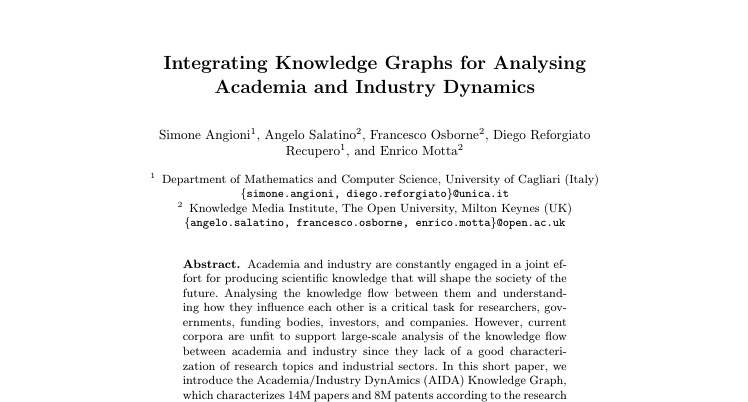
Integrating Knowledge Graphs for Analysing Academia and Industry Dynamics
Academia and industry are constantly engaged in a joint effort for producing scientific knowledge that will shape the society of the future. Analysing the knowledge flow between them and understanding how they influence each other is a critical task for researchers, governments, funding bodies, investors, and companies. However, current corpora are unfit to support large-scale analysis of the knowledge flow between academia and industry since they lack of a good characterization of research topics and industrial sectors. In this short paper, we introduce the Academia/Industry DynAmics (AIDA) Knowledge Graph, which characterizes 14M papers and 8M patents according to the research topics drawn from the Computer Science Ontology. 4M papers and 5M patents are also classified according to the type of the author’s affiliations (academy, industry, or collaborative) and 66 industrial sectors (e.g., automotive, financial, energy, electronics) obtained from DBpedia. AIDA was generated by an automatic pipeline that integrates several knowledge graphs and bibliographic corpora, including Microsoft Academic Graph, Dimensions, English DBpedia, the Computer Science Ontology, and the Global Research Identifier Database.
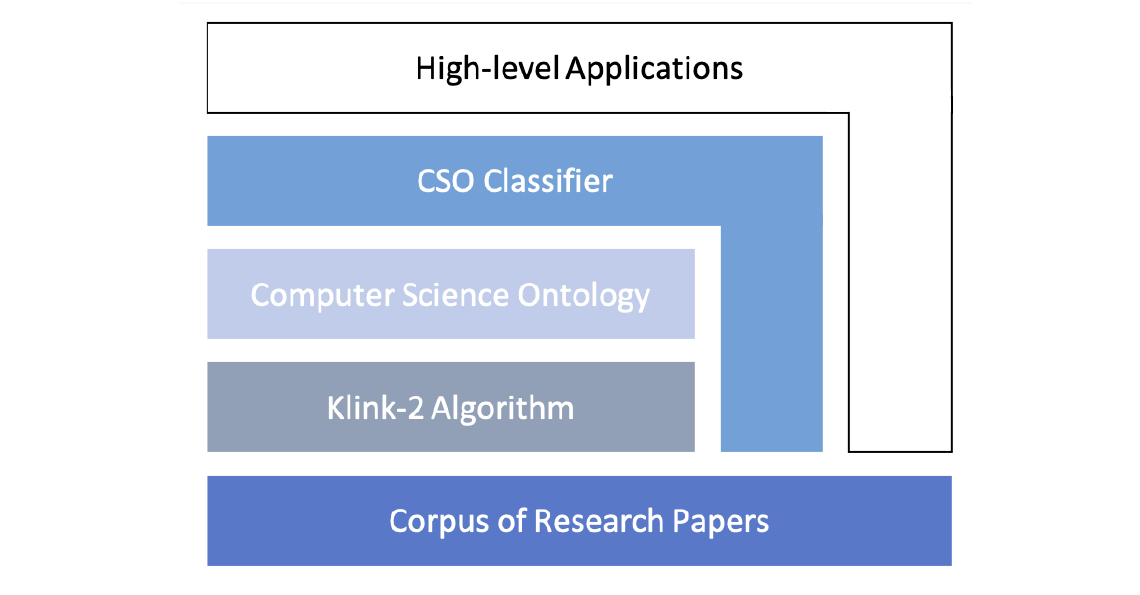
Ontology Extraction and Usage in the Scholarly Knowledge Domain
Ontologies of research areas have been proven to be useful in many application for analysing and making sense of scholarly data. In this chapter, we present the Computer Science Ontology (CSO), which is the largest ontology of research areas in the field of Computer Science, and discuss a number of applications that build on CSO, to support high-level tasks, such as topic classification, metadata extraction, and recommendation of books.
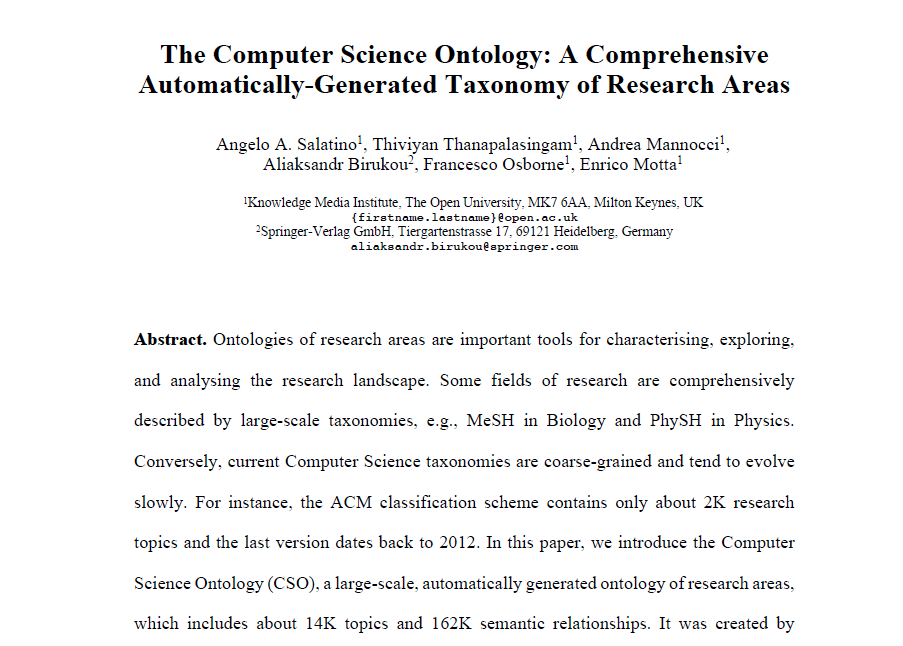
The Computer Science Ontology: A Comprehensive Automatically-Generated Taxonomy of Research Areas
Ontologies of research areas are important tools for characterising, exploring, and analysing the research landscape. Some fields of research are comprehensively described by large-scale taxonomies, e.g., MeSH in Biology and PhySH in Physics. Conversely, current Computer Science taxonomies are coarse-grained and tend to evolve slowly. For instance, the ACM classification scheme contains only about 2K research topics and the last version dates back to 2012. In this paper, we introduce the Computer Science Ontology (CSO), a large-scale, automatically generated ontology of research areas, which includes about 14K topics and 162K semantic relationships. It was created by applying the Klink-2 algorithm on a very large dataset of 16M scientific articles. CSO presents two main advantages over the alternatives: i) it includes a very large number of topics that do not appear in other classifications, and ii) it can be updated automatically by running Klink-2 on recent corpora of publications. CSO powers several tools adopted by the editorial team at Springer Nature and has been used to enable a variety of solutions, such as classifying research publications, detecting research communities, and predicting research trends. To facilitate the uptake of CSO, we have also released the CSO Classifier, a tool for automatically classifying research papers, and the CSO Portal, a web application that enables users to download, explore, and provide granular feedback on CSO. Users can use the portal to navigate and visualise sections of the ontology, rate topics and relationships, and suggest missing ones. The portal will support the publication of and access to regular new releases of CSO, with the aim of providing a comprehensive resource to the various research communities engaged with scholarly data.



